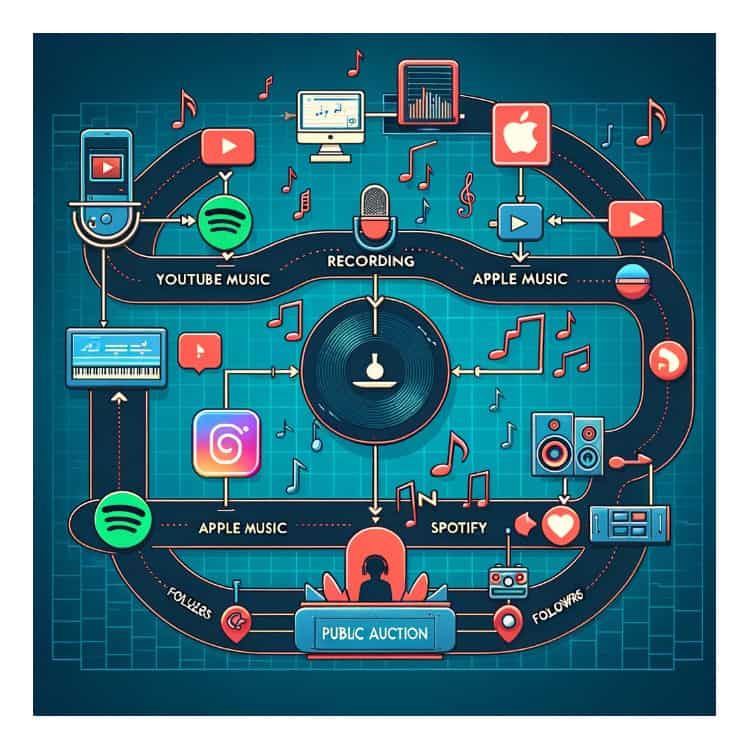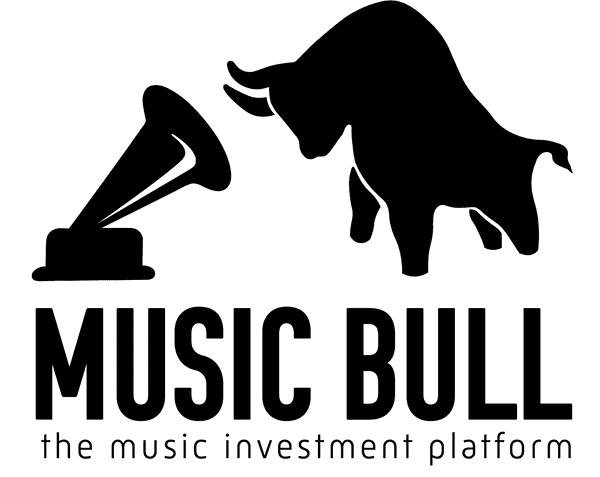Introduction:
The music industry often shines the brightest spotlight on recording artists, leaving songwriters and publishers—the true architects of the music we love—lurking in the shadows. These creative minds craft the lyrics and melodies that resonate with audiences worldwide, yet they frequently struggle with the complex and often disheartening process of monetizing their body of work. This article delves into the dilemmas songwriters and publishers face with traditional monetization models and introduces an innovative solution offered by MusicBull.
The Traditional Monetization Struggle
For many songwriters and publishers, the journey to financial stability through traditional monetization avenues is fraught with challenges. These challenges can be grouped into several key areas, each presenting unique difficulties that can hinder a songwriter’s ability to achieve lasting success and recognition.
Lack of Direct Connection with Fans
Unlike recording artists who often have a direct and visible relationship with their audience, songwriters remain behind the scenes. This lack of direct fan recognition means they miss out on the brand power and loyalty that performers enjoy.
Recording artists benefit from concerts, interviews, social media presence, and other public engagements that help them build a personal connection with their audience. This visibility translates into a strong, dedicated fanbase willing to support them through music purchases, merchandise, and live performances. Songwriters, however, rarely have these opportunities, leaving them with a weaker connection to the audience that loves their work. As a result, they struggle to create a personal brand that could elevate their career and provide financial stability.
Financial Insecurity
Selling entire catalogs or future royalties for upfront payments often means surrendering control and potential future income. This one-time financial gain can be overshadowed by long-term regrets if the music later becomes more valuable.
In traditional deals, songwriters may receive a substantial upfront payment, which can be tempting, especially if they are in immediate need of funds. However, these deals often involve selling the rights to future royalties, which means that any additional income generated by the music over time goes to the new owner. If a song gains popularity or is used in lucrative projects like commercials, movies, or covers by popular artists, the original songwriter sees none of these future earnings. This can lead to significant financial regret, as the true value of their work is only realized long after they’ve sold their rights.
Invisibility and Recognition
Despite their critical role, songwriters rarely receive the recognition they deserve. The audience connects the music to the performers, not the creators, which affects the songwriter’s ability to build a fanbase and leverage their full value.
Recognition is a powerful tool for career growth, yet songwriters often remain anonymous, overshadowed by the performing artists who bring their creations to life. This invisibility means that songwriters miss out on public accolades, industry awards, and the fan adoration that recording artists enjoy. Without recognition, it becomes challenging for songwriters to build their professional network, secure better deals, and leverage their contributions into further opportunities. The lack of visibility not only impacts their current earnings but also their potential for future projects and collaborations.
Are you ready to unleash your music bull?
Complex Valuation
Determining the value of a song catalog is inherently complex. Traditional models often fail to consider the emotional and cultural impact of music, focusing instead on immediate financial metrics.
Valuing a song or a catalog of songs involves more than just crunching numbers. Traditional valuation methods typically look at past earnings, potential for future income, and comparable sales. However, these models often miss the intangible aspects of music—its emotional resonance, cultural significance, and potential for growth in different markets or media formats.
For instance, a song that becomes a cultural anthem or a viral hit can generate significant income and influence, but traditional valuation might not account for these possibilities. Furthermore, the personal connection fans have with certain songs can drive up their value beyond what financial metrics alone can predict. This complex, multifaceted nature of music makes traditional valuation methods inadequate, often leading to undervalued sales and missed opportunities for songwriters.
Conclusion
The traditional monetization struggle for songwriters and publishers is marked by challenges that affect their financial security, recognition, and ability to connect with their audience. These obstacles highlight the need for innovative solutions that can address these issues and provide a more equitable, transparent, and empowering approach to music monetization. MusicBull aims to offer such a solution, creating new opportunities for songwriters to thrive both creatively and financially.
Enter MusicBull: A Paradigm Shift
MusicBull offers a transformative approach to monetizing music that addresses these core issues, empowering songwriters and publishers in unprecedented ways:
Direct Engagement with Fans:
- MusicBull bridges the gap between songwriters and fans, allowing songwriters to tell their story and connect directly with the audience. This connection not only enhances the songwriter’s visibility but also builds a loyal fanbase that values the creator’s work.
Public Auctions and Transparent Pricing:
- By leveraging public auctions, MusicBull ensures that the true value of music is realized. Fans and investors can bid on portions of future royalties, taking into account both emotional and financial factors. This transparent, market-driven approach ensures fair compensation and reflects the song’s true worth.
Maintaining Control Over Master Rights:
- Unlike traditional deals, MusicBull allows songwriters to retain full ownership of their master rights. This ensures that they maintain creative control and continue to benefit from their music’s ongoing legacy.
Secondary Market Opportunities:
- MusicBull’s secondary market offers liquidity and flexibility. Songwriters can sell additional rights if their music’s value increases, providing ongoing financial opportunities without losing complete control over their work.
Deepened Fan Connections:
- By involving fans in the monetization process, MusicBull transforms them into stakeholders who actively support the songwriter’s career. This partnership strengthens the emotional bond between the creator and their audience, fostering a supportive community.
Cross-Media Synergies:

- MusicBull enhances the reach and impact of each song by leveraging cross-media synergies. Different recordings and performances of the same song can attract diverse audiences, increasing the number of listeners, followers, and public awareness. This multi-faceted exposure helps maximize the song’s potential across various platforms.
Multiple Synergies and Pricing:
- Every song addresses different audiences, and with MusicBull, these multiple synergies are harnessed to their full potential. Each song can be priced according to its unique emotional and financial value, ensuring that all elements of pricing are considered.
Empowering the True Creators
Songwriters and publishers are the unsung heroes behind the success of many performing artists. With MusicBull, they can finally step into the limelight, enjoying the recognition and financial rewards they deserve. By empowering songwriters to connect directly with their fans and monetize their work through a transparent and flexible platform, MusicBull is revolutionizing the music industry.
As MusicBull prepares for its launch, we invite songwriters, publishers, and music lovers to join us in this groundbreaking journey. Together, we can celebrate the true value of music, foster deeper connections, and ensure that the creators behind the hits we love are rightfully acknowledged and rewarded.




